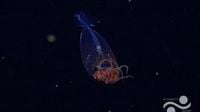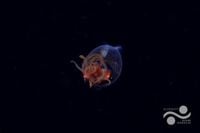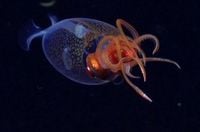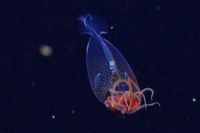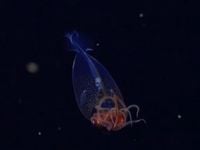On March 9, 2025, marine scientists achieved a groundbreaking milestone by capturing video footage of a juvenile colossal squid (Mesonychoteuthis hamiltoni) alive in its natural habitat for the first time in history. This remarkable event coincides with the 100th anniversary of the species' initial discovery, marking a significant moment for ocean research and exploration.
The footage was recorded at a depth of approximately 600 meters (1,968 feet) near the South Sandwich Islands in the South Atlantic Ocean, using the Schmidt Ocean Institute’s remotely operated vehicle (ROV) named SuBastian. The squid filmed measures about 30 centimeters (nearly one foot) long, a mere fraction of its potential adult size, which can reach up to 7 meters (23 feet) and weigh as much as 500 kilograms (over 1,100 pounds).
Dr. Kat Bolstad, an associate professor at Auckland University of Technology and one of the experts who verified the footage, expressed her excitement, stating, “This is the first in situ footage of a juvenile colossal squid, and it’s thrilling to finally observe this elusive species alive.” For a century, knowledge of colossal squids has primarily come from remains found in the stomachs of predators like sperm whales and seabirds, as well as from harvested toothfish.
The expedition that led to this monumental discovery was part of the Ocean Census, a collaborative effort aimed at exploring and cataloging marine biodiversity. Conducted aboard the research vessel Falkor (too), the 35-day expedition focused on searching for new marine life. This mission has already yielded significant findings, including the first confirmed footage of the glacial glass squid (Galiteuthis glacialis), captured in the Southern Ocean near Antarctica on January 25, 2025.
Colossal squids are known for their mysterious nature and unique adaptations. They possess large, sensitive eyes, which likely help them navigate the dark depths of the ocean, and they tend to remain motionless to avoid detection. Their transparent bodies and distinctive hooks on their tentacles help differentiate them from other squid species.
Thom Linley, a deep-sea fish curator on the expedition, first spotted the juvenile squid while preparing for a dive. Initially uncertain, he quickly sent a low-resolution image to his colleagues, igniting a flurry of analysis. Marine biologist Aaron Evans, a specialist in glass squids, confirmed the find. “When we saw the hook-bearing tentacles and location near Antarctica, we were overwhelmed. It was a major moment,” he recalled.
The colossal squid's elusive nature has made it one of the ocean's most enigmatic creatures. Until now, scientists had only encountered them as prey remains in the stomachs of larger predators. The recent sighting is a testament to the advancements in deep-sea exploration technology and the ongoing efforts to understand marine life.
“This is honestly one of the most exciting observations that we’ve had across the time I’ve been working on deep-sea cephalopods,” said Dr. Bolstad. “It’s a great example of the beauty of many deep-sea animals.” The footage provides a rare glimpse into the life of this extraordinary creature, shedding light on its behavior and habitat.
As scientists continue to study the colossal squid, they hope to unravel the mysteries surrounding its life cycle, diet, and reproductive habits. The footage captured during this expedition is expected to contribute significantly to the understanding of this species.
Dr. Jyotika Virmani, executive director of the Schmidt Ocean Institute, emphasized the importance of these discoveries, stating, “These unforgettable moments continue to remind us that the ocean is brimming with mysteries yet to be solved.” The team’s work is crucial not only for scientific research but also for fostering public interest in marine conservation.
The Ocean Census expedition is part of a broader effort to explore the vast and largely uncharted regions of the world’s oceans. With 95 percent of the ocean still unexplored, each new finding offers valuable insights into the complexities of marine ecosystems.
As researchers celebrate this historic achievement, they remain committed to uncovering the secrets of the deep sea. The footage of the juvenile colossal squid serves as a reminder of the wonders that lie beneath the waves and the importance of protecting these fragile ecosystems.
In conclusion, the successful capture of a living colossal squid in its natural habitat not only marks a significant milestone in marine biology but also highlights the ongoing efforts to explore and understand the mysteries of the ocean. As the team reflects on this remarkable achievement, they look forward to future discoveries that will deepen our understanding of these magnificent creatures and their role in the marine environment.
